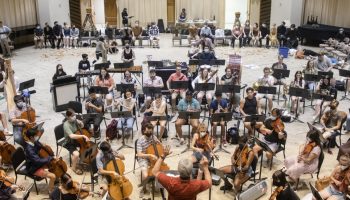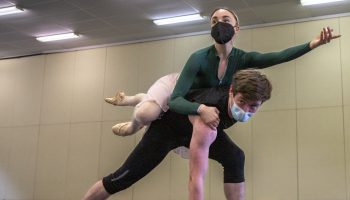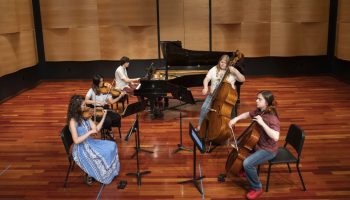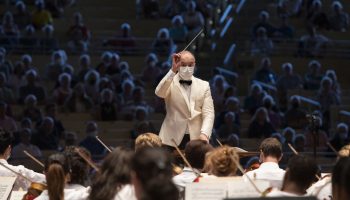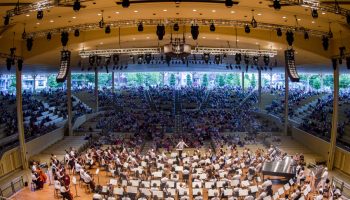NICHOLE JIANG & DAVID KWIATKOWSKI – STAFF WRITERS
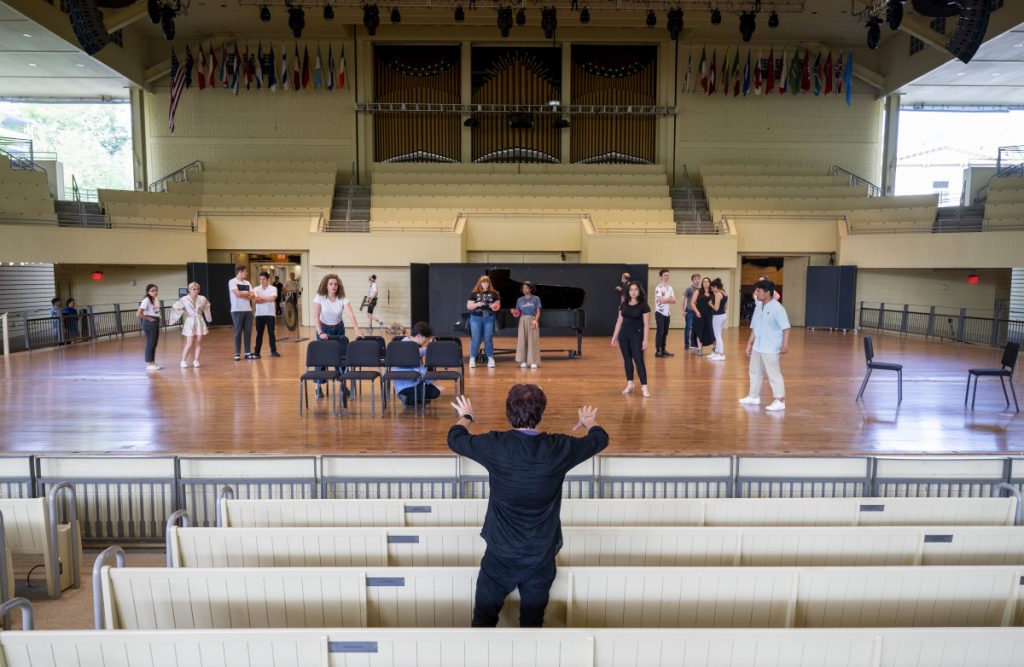
Generations both young and old can recognize the timelessness and beauty of Mozart’s The Marriage of Figaro. However, the Voice Program, accompanied by the Music School Festival Orchestra, looks to perform this classic opera in a way it hasn’t been done before.
One big obstacle was the time limit constraint from COVID-19. The opera had to be cut down from four hours to just an hour and a half. Yet this time limit also opens up opportunities, as it allows the audience to experience the full glory of the opera at 8:15 p.m. Monday, July 19 in the Amphitheater — without having to sit in the benches for as long.
“We’re picking a lot of the arias that people know which makes the entire production accessible,” said Voice student Evan Lazdowski, who’s portraying Figaro. “This is a great introduction for anybody that has a curiosity to try something new in their pursuits of the arts.”
Stage Director John Giampietro was able to accomplish keeping the essence of what makes this particular opera so loved, while staying within the time limit in a unique way. The Voice Program decided to keep in as many large ensembles, trios and duets as possible to make sure the Voice students get more opportunities to sing in a group.
“We always figured that I’d need to insert some narration between numbers to keep the storytelling going,” Giampietro said. “Although it was painful to cut the Count’s aria and Figaro’s fourth-act aria, we knew a real benefit would be that singers would be able to sing with each other again.”
What makes tonight’s performance different is the incorporation of modern aspects from our everyday lives, mixed with the grand masterpiece of both the drama and the music.
“I like the standard productions, but I also very much enjoy innovation. We’re in a process of development and in a process of discovering new ways to increase interest in operas that were composed centuries ago,” said Carlos Arcos, who’s portraying Antonio.
“If our director wants to try a new (concept) and it’s in line with the plot and the music, I’m open. It creates something new as long as the music and the story is respected. I personally do enjoy new productions and the challenge of creating something that is contemporary.”
Lazdowski agreed that Giampietro was able to find the balance between old and new.
“It’s inventive without being over the top,” Lazdowski said. “It introduces modern concepts while at the same time not straying too far away from what’s traditional. It’s kind of the Goldilocks effect — you get a little bit of this and a little bit of that, so it’s just right.”
The cast emphasized the importance of adding these elements into operas.
“I think opera is timeless,” Acros said. “We as performers and artists honor the music, and we honor the creation of the composer, but we also must honor the timing that we live in today. Part of our creative expression is to use the tools that we have in our modern day. I don’t think opera is exclusively for an older crowd, I think opera is for everybody.”
The Marriage of Figaro also allows the audience to connect with the opera on a deeper level.
“There’s so many characters, so everyone in the audience can connect with a character or different parts of each,” said Makenzie Jacquemin, who’s portraying Marcellina.
Though the opera itself was written in the 1700s, the themes can still leave a lasting impact on the audience.
This deeper connection goes both ways as the cast themselves can find pieces of themselves within the roles that they play.
“The Countess wants her love back that she once got from the Count,” said Lydia Graham, who plays the Countess. “I’ve been navigating a long-distance relationship for over a year now and the sorrows I feel from that, I can grab a lot of those things. I can pour those real emotions into my arias. A couple of times in rehearsal I find myself even tearing up.”
Because parts of the opera had to be cut down, there will be narrators who will come on stage and explain what happened in these excluded parts. While this is happening, there will be a dancer interpreting what is being narrated.
“It’s really fun and fresh,” Graham said. “Since it’s 90 minutes, we have to make up for what got cut. There’s a lot of energy on stage. It’s a really good first opera experience. If you’ve never seen an opera before, this is it.”
Since the opera was originally to be performed as the full four hours, two students were cast for the roles of the Countess (Graham and Amanda Batista) and Cherubino (Lucy Evans and Maria Consamus). To still give each student the opportunity to perform, this will still be the case and there will be a role change for these two roles.
What draws people to this opera time and time again is not just the drama itself, with its funny and relatable aspects, but also the musical masterpiece that Mozart created. The MSFO performing alongside the Voice Program will amplify the opera experience for the audience and elevate the performance making.
“I’ve gotten to perform with the MSFO before and it’s something that you just can’t describe,” Graham said. “After a year and a half with just tracks, now singing with an orchestra — it’s just glorious. It really lets you connect.”
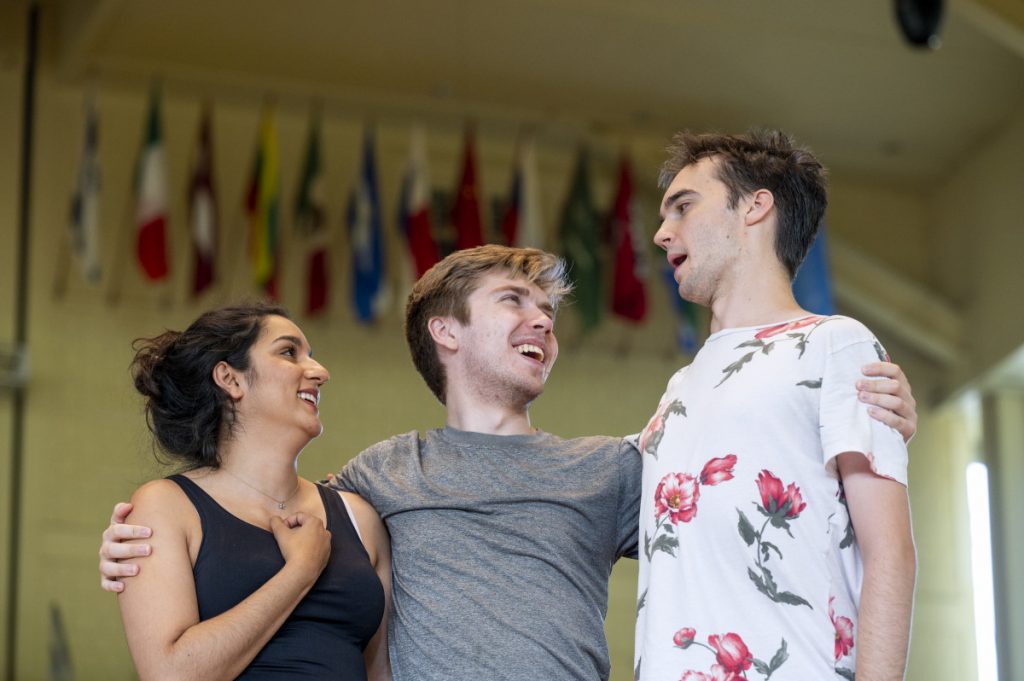
The MSFO and Voice Program working together not just creates an unforgettable experience for the audience, but allows them each to build off of each other.
“It’s always great for our instrumentalists to work intimately with singers. They learn a lot about music making from each other. There’s wonderful cross pollination,” said Timothy Muffitt, MSFO music director and conductor. “Everyone comes away from the experience from taking a deep dive into a true masterpiece. This is truly one of the great ones.”
Performing together for the first time this season and in the MSFO’s last performance of 2021, the students from both programs are looking forward to presenting such a well-known opera side by side.
“We’ve seen the orchestra around in the dorms and developed friendships with them, so it feels like a culmination of events and we finally get to come together and collaborate, which I think brings a really cool energy to the stage,” said Adam Catangui, who’s portraying Don Basilio.
For the MSFO musicians, this performance is special as they not only get to accompany the Voice Program but will conclude their 2021 season.
“It’s hard to believe we’re already at that point,” Muffitt said. “Time has been very strange this summer. It feels like we just got started, but then, our concert on Monday night feels like a week ago.”
Even though the MSFO has had a shortened season this summer, the members have flourished together as musicians.
“We’ve all gotten to know each other,” Muffitt said. “We have less rehearsal time than normal so we had to work at a greater degree of efficiency. But we’ve learned how to bridge some of those gaps and our awareness of each other has increased with every week. We’re a tightly knit unit right now.”
Looking back on their season, the members of the MSFO were grateful to be able to produce live music once again.
“I am so grateful we had the opportunity to play a concert every week,” said Justine Teo, MSFO violinist. “The setup is a little different, making it harder to hear each other, so that’s something we have had to get used to. I think we’ve been able to overcome these little challenges and perform well together. We’ve also become a lot closer from our time here together, and that makes the rehearsal and performance experience even more meaningful.”
With this beloved opera’s modern twists, tonight’s performance is both familiar and innovative.
“Mozart and (librettist) de Ponte talk about aspects of life that were true 100 or 200 years ago, and even though our environments are rapidly changing, I think that we as humans will always experience joys and love and forgiveness whether we are behind a screen, on Zoom or we are meeting in person,” Acros said. “I think that the composer speaks about the human experience and that is something you can’t put a date to. When you fall in love a hundred years ago or today, for humans, it’s something we can relate to.”

